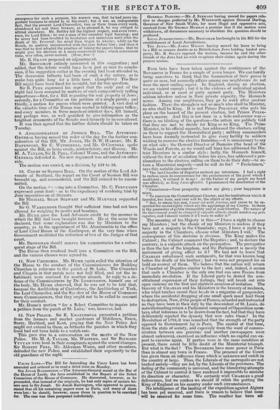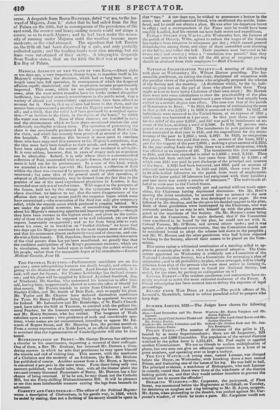Even bets have been taken against the continuance of the
BOURBONS in France for a couple of years longer. We can hardly bring ourselves to think that the termination of their power is quite so near, but assuredly affairs among our neighbours do not wear the most smiling aspect. In England, during an election, we are violent enough ; but it is the violence of individual against individual, or at most of party against party. The Ministers seldom interfere unless in their private capacity, the Monarch never. Among our neighbours, they go to work after another fashion. There the struggle is not so much who shall be Minister, as who shall be King. It is not Prince POLIGNAC who puts his place on the hazard of the present election, but Prince POLIG- NAC.S master. And this is not done in a hole-and-corner way— there is no blinking of the question—the nation are publicly told that they are met to decide for King or no King. The Prime Minister, in his official capacity, has addressed the electors, calling on them to support the Monarchical party ; military commanders have been formally instructed to give every facility to soldiers wishing to exercise the elective franchise,—it is unnecessary to say on what side ; the General Director of Domains (the head of the Woods and Forests, as we would call him) has addressed the Dis- trict Directors in a similar style ; lastly, the Monarch himself, without the fear of revolution before his eyes, has addressed a pro- clamation to the electors, calling on them to do their duty—to re- turn a Ministerial majority—and he will do his! " Frenchmen," says this.notable document- " The lastChamber of Deputies mistook my intentions. I had a right to reckon upon its concurrence for the performance of the good which I meditated ; it refused it to me As the Father of my people my heart was afflicted; as King I was offended. I pronounced the dissolution of the Chamber.
"Frenchmen—Your prosperity makes my glory ; your happiness is mine.
"To maintain the Constitutional Charter, and the institutions which it founded, has been, and ever will be, the object of my efforts.
" But, to attain this end, I must act with freedom, and cause to be re- spected the sacred rights which are the appendage of my Crown. In them is the guarantee of public tranquillity and of your liberties. The nature of the Government would be changed if culpable attacks should weaken my pre. rogative, and I should violate it if I were to suffer it."
The meaning of his Majesty is this—" I have a right to choose my Ministers ; but the choice of my Ministers is useless if they have not a majority in the Chambers ; ergo, I have a right to a majority in the Chambers, choose what Ministers I will." The consequence of this doctrine is obvious. The King makes the Cabinet ; the Cabinet command the Deputies ; and, to declare the contrary, is a culpable attack on the prerogative. The prerogative is thus the law of the kingdom, and the Parliament is merely the instrument of giving effect to it ! We had not to learn that CHARLES entertained such sentiments, for that was known long before the death of his brother ; but we were not prepared for so bold an avowal of them. We believe that the nation will return a Chamber of Deputies similar to the last ; and, indeed, it seems that such a Chamber is the only one that can save France from immediate revolution. If the Liberal party be denied the con- stitutional expression of their feelings, they will break out into open violence on the first and slightest occasion of irritation. The bravery of CHARLES and his Ministers is the bravery of madmen, who whirl torches round their heads in a magazine of gunpowder, where the accidental dropping of one small spark must hurl them to destruction. Now, if the people of Frairee,ischooled and instructed as they have been in their duty by the descendant of St. Louis, do notwithstanding return a Parliament composed of Opposition mem- bers, what inference is to be drawn from the fact, but that they have deliberately rejected the dynasty that now rules them ? In the Revolution of 1793, it was remarked that the strength of the party opposed to Government lay in Paris. The capital at that time, from the state of society, and especially from the want of commu- nication between one province and another (newspapers were almost unknown), exercised an influence which no capital can ex- pect to exercise again. If parties were in the same condition at present, there could be little doubt of the Ministerial triumph. But what is the fact? The BOURBONS have more power in Paris than in almost any town in France. The presence of the Court has given them an influence there which is unknown and unfelt in the country at large. Thus, the Liberals of the metropolis are not backed merely—they are led, by the Liberals of the provinces. The feeling of the communityis universal, and the blundering attempts of the Cabinet to control it have rendered it impossible to mistake its direction or character. We certainly wish CHARLES a good deliverance, but we confess we should ill relish the putting the King of England on his country under such circumstances. No intelligence of the landing of the expedition against Algiers has been yet received, and there is reason to believe that none will be received for some time. The weather has been ad- verse. A despatch from Baron DUPERRE, dated "at sea, to the lee- Ward of Majorca, June 2," states that he had sailed from the Bay of Palma on the 29th, but in consequence of the prevalence of the east wind, the reserve and heavy-sailing vessels could not shape a course so as to reach Algiers; and he had been under the neces- sity of running under Majorca until the weather became more moderate, or the wind changed. The squadron that left Toulon on the 27th ult. had been dispersed by a gale, and only partially collected again ; and the landing-boats were also missing, but no fears were entertained of their safety. A telegraphic despatch from Toulon states, that on the I I th the fleet was at anchor in jhe Bay of Palma.



























 Previous page
Previous page